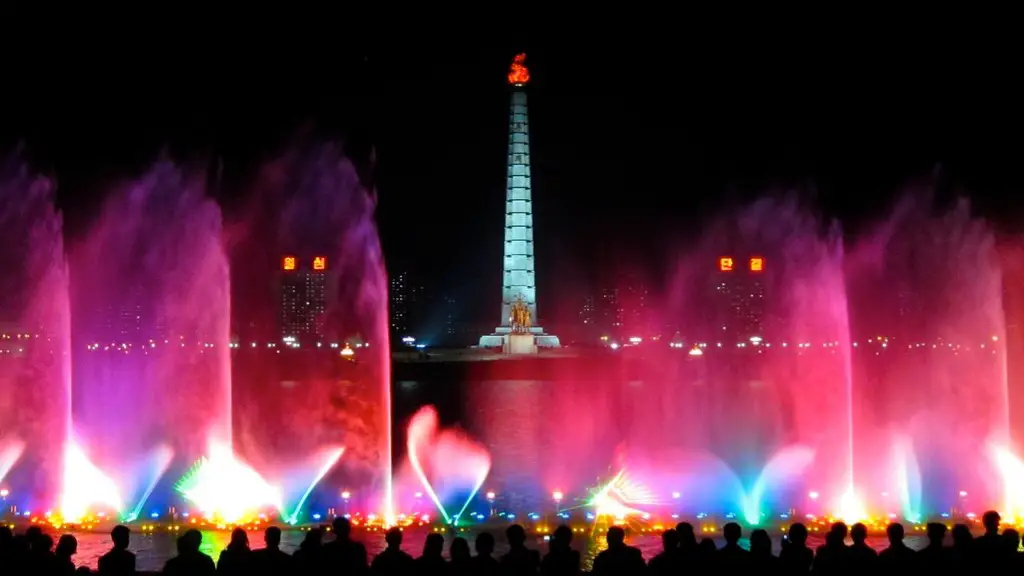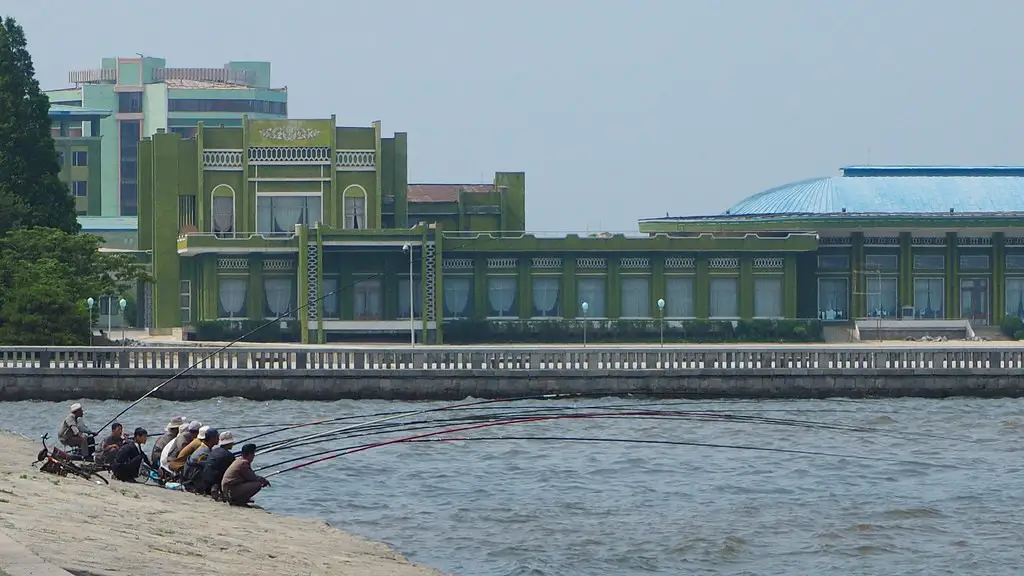Living in the 21st century, the whole world has become interdependent. However, there are still some places that can be called an enigma, a complete and decided mystery that leaves most people speechless. One such place is North Korea, whose relations with the rest of the world have been often tense. People all over the world tend not to like North Korea, due to its policies and politics. But why do they actually hate the country and its leaders?
The general opinion of people outside of North Korea is often shaped by news, events, and diplomatic relations. Many nations have objected to policies like nuclear weapons build-up, starvation and famine, human rights violations, and military aggression. It is widely believed that North Korea does not comply with international standards, and is often viewed as an authoritarian or oppressive state. The United Nations has also criticized North Korea for its human rights abuses, including violations of freedom of expression, religion, and association. The country is also seen to be an adversary for the international community, as it has been involved in multiple conflicts with other countries.
Another factor that drives dislike of North Korea is its controversial leader, Kim Jong-Un. Kim is known for his hardline approach to foreign policy, and his frequent threats to use nuclear weapons against other nations. He is also seen as a dictator who has quashed any dissenting opinion, and oppressed his people by denying them basic rights. These policies have made North Korea unpopular, as they have been seen as aggressive and threatening.
People also tend to dislike North Korea because of the way it is perceived to have acted against its own citizens. Many have accused the government of committing human rights abuses, such as arbitrary detention and torture, violations of freedom of expression, and suppression of dissent. This has caused many people to be appalled by what they consider to be unspeakable acts.
North Korea’s international attitude also serves as a further reason for people’s dislike of the country. North Korea has been involved in several conflicts with neighboring countries, such as South Korea, China, and Japan. North Korea has also engaged in terrorist activities that have been condemned by many nations. These policies have made it difficult for other countries to have diplomatic relations with North Korea, further decreasing its popularity.
Finally, many people simply distrust North Korea because they feel it is not properly represented in the media. Their media doesn’t tend to carry the same news from other countries, and so North Korea is often seen as an untrustworthy place. This causes people to doubt itsclaims and statements, thus making them dislike the country even more.
Sanctions imposed on North Korea
International sanctions have long been imposed on North Korea in response to its illegal nuclear weapons program. The United Nations Security Council has adopted multiple resolutions that expound the terms of the sanctions, which range from limited resources exports, import of certain weapons and materials, and travel restrictions. The US, the UK, and other countries have also imposed their own sanctions on the DPRK, in an effort to pressure the regime to abandon its nuclear ambitions. These punitive measures have made it even more difficult for North Korea to engage with the world, causing its global reputation to further deteriorate.
Sanctions have often been criticized by some, as they have had a disastrous effect on the people of North Korea. The UN has warned that these measures may have a severe impact on food security and access to healthcare, and other basic services. Many have argued that these sanctions are merely a way for other countries to put pressure on North Korea, without considering the consequences for its citizens. Nevertheless, the sanctions remain in place, further deepening the animosity between the DPRK and the international community. In turn, this has only made the people of North Korea more distrustful of the outside world.
The sanctions also inhibit the progress of North Korea’s economy and its ability to interact with the rest of the world. Despite the harsh sanctions, North Korea’s government and businesses still need to purchase goods and services from overseas. Since North Korean businesses often lack the resources to do this, they have to rely on countries that are willing to break the sanctions, thus diminishing their chances of success. Additionally, the sanctions have made it difficult for businesses to access capital, which is necessary for investment, innovation, and growth. All these factors combined make the economic situation in North Korea even worse, causing further distrust of the outside world.
Ultimately, the sanctions imposed on North Korea have demonstrated to people that the international community will not tolerate its controversial policies. However, they have also made it more difficult for North Korea to engage with the rest of the world, further increasing the animosity between them. It is this distrust that has made people all over the world hate North Korea.
Social, Political and Cultural Isolation
The social, political, and cultural isolation of North Korea has only served to further worsen the dislike of North Korea by the rest of the world. The North Korean government has long tried to manage and control any information coming in from the outside. This has made it difficult for outsiders to get a reliable impression of the state of affairs in North Korea, further worsening the opinion of North Korea.
In addition, North Korea has been increasingly isolating itself from the rest of the world, both culturally and politically. It has banned any sort of international exchange, including travels of its citizens, political parties, and cultural activities. This has made it difficult for the world to understand and engage with the North Koreans, as they have been cut off from the international flow of information. Moreover, North Korea has often seemed uninterested in engaging in dialogue with foreign countries, which has not helped its global image either.
The social, political, and cultural isolation of North Korea has caused much of the rest of the world to become suspicious of the country. People from the outside see North Korea as a troubling, untrustworthy, and mysterious place. This suspicion has made it even harder for North Korea to remain engaged in the global dialogue. It is this isolation that has caused people to hate North Korea even more.
Moreover, North Korea’s isolation has given it a reputation of being a “black box”. This has made it difficult for outsiders to know what is really going on within the country. It is only logical that this perception would worsen its reputation, as the world has come to think of the country as a mysterious and intimidating place.
Lack of Democracy and Communication
The lack of democracy and communication in North Korea has furthered its reputation for being an authoritarian regime. North Korea is widely known for its lack of basic freedoms, such as freedom of speech and assembly. This lack of liberty has made it difficult for the world to understand and interact with North Korea, further worsening its reputation.
Moreover, North Korea’s lack of communication further deepens the opinion of people outside of the country. North Korea rarely interacts with the rest of the world, as its isolationist policy serves to keep them outside of the international dialogue. This lack of communication has made people think that North Korea is uninterested in engaging with other countries. This lack of interaction has only made the dislike of North Korea stronger, as people feel that they cannot trust a country that refuses to communicate clearly.
In conclusion, North Korea has garnered much negative publicity due to its policies, politics, and leaders. People hate North Korea because they believe it is an oppressive regime that does not comply with international standards. They also suspect that North Korea is uninterested in engaging with the world, and are further worried by its lack of freedom and democracy. All these factors have caused North Korea to be seen as a dangerous and untrustworthy place, making its global reputation worse by the day.
Economic Struggles
North Korea’s economic struggles are another factor that has caused people to dislike the country. North Korea’s economy is largely dependent on agriculture, but it has been suffering from food shortages due to drought and poor access to resources. This economic hardship has resulted in widespread poverty and malnutrition, as the government can’t provide its citizens with enough food. This lack of resources has made people outside of North Korea worry about the well-being of its citizens, fuelling their mistrust of the country even further.
Additionally, people worry that North Korea’s economic struggles may lead to instability. As poverty and deprivation increases, people may become increasingly angry and frustrated with the government. This could, in turn, spark a revolt against the government, which would be destructive for the country and its people.
Furthermore, North Korea’s economic isolation may lead to other countries taking advantage of it. Countries like China and Russia may try to exploit North Korea’s dire economic situation, making it even worse for the citizens of North Korea. This could further worsen the opinion of North Korea, as many countries may come to think of it as a puppet state of its neighbors.
Overall, North Korea’s economic struggles have made people outside of the country worry about the safety and well-being of its citizens. They fear that the country may succumb to instability and exploitation, further worsening its already dire economic situation. This has caused people to fear and mistrust North Korea even more.
Propaganda
In addition to its economic struggles, North Korea’s use of propaganda has caused many people outside of the country to mistrust and dislike it. North Korea heavily propagates its own ideas and values, while seeking to suppress other opinions. This has caused people outside of North Korea to worry that the citizens of North Korea may be misled, and their opinions shaped by the government.
Moreover, North Korea’s propaganda has increased the tension between it and the rest of the world. North Korean officials often use inflammatory rhetoric when referring to other countries, and this has made many people dislike North Korea even more. This has caused international tension to increase, as countries lose trust in North Korea and view it as a threat.
Additionally, North Korea’s state-run media has not helped its public image either. North Korean media outlets rarely carry news from the outside, and instead focus on promoting the message of the government. This has caused many outsiders to distrust North Korea, as they cannot get a reliable picture of what is going on in the country.
In conclusion, North Korea’s use of propaganda has made many people fear and distrust the country. People outside of North Korea are worried that the citizens of North Korea may be misled by the government, and they fear that the country’s progressive rhetoric may lead to international conflict. Furthermore, North Korea’s state-controlled media has made it difficult for outsiders to get a reliable picture of what is going on in the country, causing them to further distrust North Korea.





